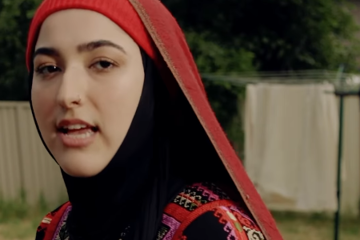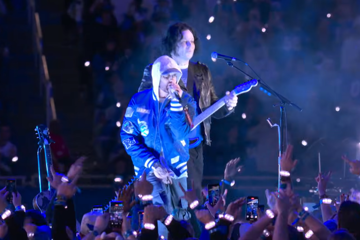Touring With Flickerfest Charles Williams Breaks All The Rules In His Latest Short Film
Aussie filmmaker Charles Williams doesn’t much care for rules. He tells Joseph Earp about storytelling on a shoestring budget and why the kids are alright.
There’s an old adage in the film industry: never work with children or animals. All These Creatures, the Palme d’Or-winning short from celebrated Australian filmmaker Charles Williams, touring nationally as part of Flickerfest, seems determined to prove this wisdom wrong.
The film is stuffed with animals, from an ill-fated dog to a small, invasive army of pissed-off beetles. Its human cast is almost exclusively populated by adolescents, chiefly the young lead Tempest (played by Yared Scott, and voiced, in poetic narration, by Melchisedek Nkailu).
“It was almost a laundry list of what is ill-advised,” Williams agrees. “But it was a calculated risk. It’s what this movie needed, and I felt painting ourselves into a corner with some of these choices would result in something pretty special – if we managed to pull it off.”
An elegiac, elliptical tale of childhood and mental illness, All These Creatures is a profoundly visual experience. The film pulses with its own teenage heat and with a strange, particular kind of melancholy. In that way, it calls to mind the best work of philosopher-filmmaker Terrence Malick, or the dream-like visual poetry of Wong Kar-Wai. Not, mind you, that it’s the obvious aping of a more successful director’s style, as so many shorts can sometimes turn out to be. All These Creatures speaks in a precise, deeply nostalgic language all of its own.
Williams wrote the short quickly, over about a month, just after the birth of his daughter. It is the crystallisation of themes that have been rattling around his head for years: sickness, childhood, memory, regret. “I’d been toying with a way to get these obsessions of mine into a film for a long time, but never found a way to make it work,” he explains. “Or maybe I was a bit ashamed to.”
Most shorts are shot on a tight budget, but All These Creatures was pulled together on little more than a wing and a prayer. “Tight probably doesn’t cover it,” Williams says. “It was all favours. Everyone on the film worked for free and most of what could be called the ‘budget’ was sponsorships I organised with different partners. I still haven’t paid off the money I put in. So, like a lot of shorts, it was really made by the generosity of everyone involved – which I’m incredibly grateful for.”
The budgetary restrictions – not to mention the age of the young lead – also affected the length of time that Williams had to shoot the film. Days were short and Williams only had five of them, plus one rushed, sweaty day of pick-ups. “When you have a cast of people under 15, child labour laws dictate that you can only shoot six hours,” he says. “Then, of course, there’s weather problems, working with bugs, animals, road closures, and a number of decayed and dilapidating locations, one of which was bulldozed just as I came to do pick-ups. So the shooting days went very quickly.”
That might make All These Creatures sound rushed, or the kind of lo-fi product that tends to characterise a lot of the work of emerging filmmakers. In fact, more than anything, the result is profoundly considered. Nothing seems slapdash, from the tight direction and emotional intensity of the script to the gently devastating finale. Powerful and considered, the film boasts a kind of emotional intelligence that’s rarely seen even in big-budget Hollywood affairs.
"What we’re really doing is stigmatising people who are genuinely suffering and making them synonymous with people who may just be ‘shitty’."
Yet perhaps most impressive of all is All These Creatures’ depiction of mental illness. Tempest’s father, Mal, played with halting, uneven grace by celebrated performer and NIDA star Mandela Mathia, is struggling with thoughts that he can barely understand. Paranoid and angry, he lashes out at his friends and family, isolating himself ever further from the people trying to help him.
But despite it all, Mal is no villain; no one in the short is. They are just people, all of them: confused, scared, and utterly human. “No one knows for sure which part is the sickness and which part is just you,” Tempest considers at one point, fearing for his father’s health and concerned that he might be losing his own mind.
“The challenge of rendering [mental illness] honestly and cinematically seemed kind of impossible,” Williams admits. “For a long time it was a real struggle for me, trying to traverse the landscape of ‘mental illness’ but also the grey area about where that leads.
“For example, like everyone, I couldn’t get away from all the Trump news at the time, and there was a lot of talk about him being mentally ill: lots of psychiatrist weighing in without ever actually meeting him. Then the head of the DSM weighed in and said something to the effect of, ‘Trump isn’t mentally ill. He’s doing great. He’s not suffering. It’s not an illness to have a bad personality. He may be a piece of shit, that doesn’t mean he’s sick.’
“It’s an important sentiment, especially now when it’s very in vogue to label people we don’t like as ‘mentally ill’, really just to make ourselves sound more sophisticated... What we’re really doing is stigmatising people who are genuinely suffering and making them synonymous with people who may just be ‘shitty’.”
That’s really the key to All These Creatures. It’s not a film that seeks to demonise those who might be suffering. In its quiet, cathartic way, it has an empathy and humanity all of its own. And it’s a stirring call for understanding, at a time when society can tend to undervalue forgiveness.
All These Creatures plays from 12 Jan at Bondi Pavilion, part of Flickerfest 2019







